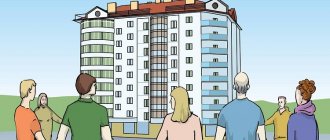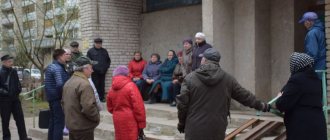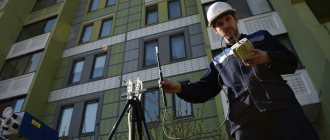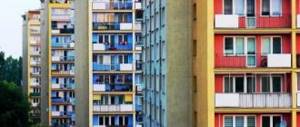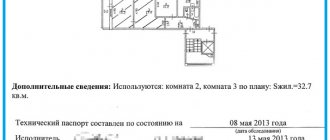In cases specified by law, it becomes necessary to conduct an absentee vote of homeowners.
The procedure for holding a general meeting (hereinafter also referred to as the General Meeting), its form, voting rules (hereinafter also referred to as polling) and the execution of decisions are contained in Art. 44 – Art. 48 LC RF (hereinafter referred to as the Code) and in other regulations.
Based on Part 1 of Art. 44 of the Code, the OS is recognized as the sole body for the management of apartment buildings and is organized for the purpose of making decisions on issues presented on the agenda.
At the meeting, apartment owners can resolve almost any issues related to apartment buildings, for example:
- establish that the amount of the contribution for major repairs will be higher than the minimum established by the constituent entity of the Russian Federation (if contributions are received in a special account);
- make a decision on landscaping the local area;
- choose the method of managing the apartment building - HOA, management company or direct management;
- select or replace a resource supplying organization;
- other questions.
There are only 3 forms of holding meetings, and they are listed in Art. 44.1. Code:
- in-person voting, that is, the personal presence of each owner and collegial discussion of all issues on the agenda;
- part-time;
- correspondence (details below).
According to the general rule established in Part 1 of Art. 45 of the Code, the OS is held once a year on the initiative of the chairman of the MKD council.
Owners of apartments in an apartment building, which is managed by a management company or HOA, can apply for an extraordinary OS.
In another case, for example, with direct management, the convening of the OS can be carried out by any of the owners - regardless of the number of votes he has.
The main requirement is that the initiator of the OS is obliged to notify other residents of the date and place of the meeting by sending registered letters to each owner (Part 4 of Article 45 of the Code). Another notification method may be approved by the OS. You must notify no later than 10 days before the actual date of the OS.
Based on Part 1 of Art. 47 of the Code, it can be held in absentia only if a decision was previously made to hold an OS, but the actual turnout of the owners did not allow the OS to be recognized as competent (that is, owners with less than 50% of the votes of their total number came to the OS).
The procedure for conducting an absentee survey is as follows:
- the initiator issues a written notice to each owner of the premises, which indicates the address or place for sending (transferring) ballots;
- Owners must submit ballots .
The validity of an absentee meeting does not depend on the quorum - that is, the decision is made on the actual ballots submitted.
A popular question is how is in-person and absentee voting conducted for homeowners ?
The answer is based on Part 3 of Art. 47 of the Code, absentee voting refers to a procedure in which apartment owners first gather to discuss issues in person, and then make a decision by delivering ballots to the chairman of the apartment building council or another responsible person (as in absentee voting).
Art. 47.1. The Code regulates the possibility for owners to organize an OS and make a decision at it that all subsequent absentee voting will be conducted using electronic voting means (on the website of the State Information System of Housing and Communal Services).
In this case, all interaction between the OS administrator and residents will be carried out exclusively using such a system (including the placement of electronic images of protocols).
The procedure in this case:
- the initiator of the meeting notifies the administrator of the need to hold an OS at least 14 days in advance;
- the administrator places the relevant information in the system 10 days before the meeting;
- from the start date of the survey, owners make decisions by marking the required options – “For”, “Against” or “Abstain”;
- votes are accepted within 3–5 days (Part 8 of Article 47.1 of the Code);
- within 1 hour after the end of voting, the results are published in the system.
In order for a decision on a certain issue to be made, it is necessary that the majority of those who took part vote “For” (Part 1 of Article 46 of the Code), however there are exceptions. For example, at least two-thirds of those participating must vote to establish a contribution for major repairs that is more than the minimum tariff.
Note that votes are not specifically owners, but a value that depends on the share in the right of ownership of common property (Part 1 of Article 37 of the Code). In other words, the owner with a larger apartment area will have more votes.
The results of the OS are documented in a protocol.
Methodological recommendations for its execution are contained in Order of the Ministry of Construction No. 937/pr dated December 25, 2020 “On approval...”.
- Title of the document;
- date, place of the meeting (for absentee polls, the end date for accepting ballots and the address for receiving them is indicated);
- registration number of the protocol (the serial number from the beginning of the year is indicated);
- content part, which in turn consists of introductory and main parts;
- place and period of storage of the protocol;
- applications;
- signatures.
So, an absentee poll is carried out only if there is no quorum during an in-person poll. Those who brought completed ballots are considered to have taken part in absentee voting. The procedure for counting votes and making decisions is the same as for an in-person poll.
Homeowners' association, as a form of management of apartment buildings, is relevant today. Its functions are quite extensive, including the ability to hold several forms of meetings at once. As a rule, the full-time course is conducted first, and then the correspondence course. This sequence cannot be changed. All acts adopted by the HOA must be open to review.
According to federal regulations, if the HOA was chosen as a way to manage the apartment building, then all decisions made as part of the general meeting must take several forms:
- open voting;
- semi-closed expression of will.
During in-person voting, all owners of housing and premises in an apartment building must be present at a certain place and at a certain time, which are indicated in the notice of the meeting.
This is interesting: Act on prohibiting housing and communal services employees from entering the apartment: sample 2020
If the in-person/absentee form is used, then in this case some owners may not be directly present at the meeting for one reason or another. To clarify their decision regarding the agenda, an additional personal survey is carried out, where their opinion is clarified.
The decision of the general meeting can also be delivered to their home.
It seems possible to distinguish several stages in this form:
At this stage, a document is drawn up that marks the agenda. It indicates the issues to be voted on, the location of the vote, the person in charge and other most important housing aspects.
- The direct process of casting and counting votes.
When choosing an in-person or absentee form of voting, you need to take into account that it is advisable to use it in situations where it is necessary to obtain at least two-thirds of the votes or a quorum. As a rule, such a need arises when determining a housing and communal management scheme, clarifying financial issues, etc. In-person voting is carried out openly, in accordance with federal state legislation. To do this, the votes of those present at a certain address at a certain time are counted. In absentia, as a rule, it is carried out after the in-person one. This is a kind of survey. Also, during such a vote, citizens must be notified of the decision made as part of an open poll.
The results of in-person and absentee voting are documented in a document that must be publicly available. It indicates the number of participants, acts adopted during the questionnaire, establishes organizational issues and notes the responsible initiator of the plebiscite. Also, this document should reflect the number of voters both “FOR” and “AGAINST” a particular issue that was put on the agenda.
Since the in-person and correspondence form is quite specific, the agenda standard published before the meeting must indicate the regulation of its holding, during what date the in-person and correspondence parts will be held and other significant issues. All this is necessary for the meeting to be recognized as legal and held in accordance with Russian legislation.
The main regulatory legal act regulating the activities of HOAs is the Housing Code of the Russian Federation. This is where all the essential aspects of holding meetings are reflected. A significant omission in modern law is that it does not define a date in the form of the start and end dates for absentee voting.
Based on the general meaning of civil law, it must occur within a reasonable time. Typically, the meeting notice will include the date the authority received the required ballots from residents.
This possibility is permitted in accordance with Russian legislation. Absentee voting, as an independent form of holding a general meeting of owners, can be implemented, as a rule, on minor organizational issues for which, in accordance with the law or the charter of the organization, more than half of the votes of the residents are not required. As a rule, such meetings rarely occur in residents' households. This is due to the fact that in the future they can easily be challenged in court.
When implementing the policy of the HOA in the form of holding in-person, absentee, or simultaneously both of these forms of voting, the executive body of the cooperative, upon completion of the counting of votes, issues a special act called a protocol. It reflects:
- in what area of HOA activity was the question taken?
- what decisions were made, when they are to be made;
- whether several forms of voting took place in parallel;
- what was the participation, voting procedure, etc.
This act is signed by the chairman of the HOA.
In that situation, if it reflected inaccurate information or it affects the rights and legitimate interests of other persons, it can be appealed both to the HOA itself and to the state authority exercising control and supervision of the housing and communal services sector.
The protocol is a written act, which must reflect:
- The name of the body that held this meeting, its full corporate name and legal address.
- Date of announcement of the agenda.
- On what occasion was the vote taken?
- What theses and proposals were expressed by the residents.
- The procedure and timing of both full-time and distance learning.
- Number of votes of residents.
- Acts adopted during the meeting.
- Date of preparation of the protocol and signature of the authorized person.
The protocol is subject to official publication and is publicly available. For refusal to provide this document, the HOA official is subject to administrative liability.
The protocol form can be downloaded from the link here. ⇐
In a situation where there was not an ordinary, but an absentee vote, the owner who did not participate openly can express his decision in writing. It must indicate on what issue he is sending his response, his place of residence, last name, first name and patronymic, as well as the date of signing the act.
Download a sample application here. ⇐
Another important document is the absentee voting ballot, conducted in conjunction with the in-person voting. It must meet the requirements set forth in both civil and housing legislation.
When voting in absentia, specific acts are used - sheets. They are a kind of reflection of the will of the owners. They indicate the agenda, the issues to be raised, as well as the procedure and deadlines for giving a response.
No later than ten days from the date of the actual meeting, bodies with special competence must fulfill their duty to notify citizens living in an apartment building about the voting results. All protocols and acts must be in the public domain! For example, on the organization’s website or at an information stand.
For refusal to provide the requested information, the perpetrators may be subject to administrative liability. If a fraudulent component is detected, criminal liability may arise.
This is interesting: Sample inspection report for an electricity meter 2020
Thus, the law allows for the possibility of making decisions in two parts - in person and in absentia simultaneously. In both cases, decisions must be made in the manner and according to the rules provided for by current Russian legislation.
Sample absentee voting ballot for 2020 HOA
If it is not possible to gather the required number of co-owners, then you have to resort to absentee voting. The procedure assumes that citizens do not gather together in any room, so they receive ballots, which are then filled out at home.
We recommend reading: Sample speech of a lawyer in a debate in a criminal case, Art. 228
Creation of TSN: Preparation and execution of protocols, voting ballots and decisions of the OSS
__________________________________________________________________________ ————————T—————————T———————— ¦ FOR ¦ AGAINST ¦ ABSTAINED ¦ +———————-+———— —————+————————+ ¦ ¦ ¦ ¦ L———————-+—————————+————————- Owner of the premises (representative) __________________ __________________ (signature) (full name) “___”______________ ___ g.
Based on Part 1 of Art. 47 of the Code, it can be held in absentia only if a decision was previously made to hold an OS, but the actual turnout of the owners did not allow the OS to be recognized as competent (that is, owners with less than 50% of the votes of their total number came to the OS).
Conditions for recognizing OCC decisions as illegitimate
The list of reasons why OCC decisions may be considered unlawful is quite extensive. Let us dwell on those points in relation to which the management company may make mistakes and which may lead to the owner going to court.
Firstly, the basis for invalidating OSS decisions is the initiation of OSS by a person who did not have the legal right to do so. Let us recall that the initiator of the OSS can be:
- any of the owners of the house (part 2 of article 45 of the Housing Code of the Russian Federation);
- UO (part 7 of article 45 of the Housing Code of the Russian Federation);
- MA, the board of the HOA, housing complex or housing cooperative upon a written request from the owners who have at least 10% of the total number of votes (Part 6 of Article 45 of the Housing Code of the Russian Federation);
- local government body (part 2 of article 161.1; part 1.1 of article 165 of the Housing Code of the Russian Federation).
In practice, there are often cases when OSS is initiated by a person who is not the owner or by a third-party management company. And since they cannot be legal initiators, the decisions made at such an OCC are also illegal.
Secondly, at the meeting of owners only those issues that are within the competence of the OSS can be considered (see Article 44 of the Housing Code of the Russian Federation).
Thirdly, to recognize the decision of the OSS, a quorum is required - more than 50% of the total number of votes of the owners (Part 3 of Article 45 of the Housing Code of the Russian Federation). And to make decisions (depending on their type), you need a simple (more than 50%), qualified (⅔) or absolute (100%) majority of votes. If, for example, a decision requiring the support of ⅔ votes of the owners was made by a simple majority, this is a basis for challenging such a decision in court.
In addition, the MA needs to keep an accurate count of votes: it is imperative to take into account that the number of votes that each owner of the premises in the MKD has on the OSS is proportional to his share in the right of common ownership of the POI in this MKD (clause 3 of Article 48 of the Housing Code of the Russian Federation) and is calculated using a simple formula: 1 sq. meter = 1 vote.
Fourthly, the OSS does not have the right to make decisions on issues not included in the agenda of the OSS, or change the agenda of the meeting. Accordingly, a decision made on issues not indicated on the agenda is unlawful (Part 2 of Article 46 of the RF Housing Code).
Fifthly, there are a number of violations provided for not only by the RF Housing Code, but also by other legal acts. They can also become the basis for declaring decisions of the OSS illegitimate. These include the following:
- there has been a significant violation of the procedure for convening, preparing and holding a meeting, affecting the expression of will of the meeting participants (Part 1 of Article 181.4 of the Civil Code of the Russian Federation) - for example, notification of the holding of an OSS for a period of less than 10 days (or another period accepted by the owners);
- the person speaking on behalf of the meeting participant did not have authority (Part 1 of Article 181.4 of the Civil Code of the Russian Federation) - there was no power of attorney or the power of attorney was executed incorrectly;
- there was a violation of the equality of rights of meeting participants during its holding (Part 1 of Article 181.4 of the Civil Code of the Russian Federation);
- There was a significant violation of the rules for drawing up a protocol (clause 3 of Article 181.2 of the Civil Code of the Russian Federation).
- forgery of ballots (Article 327 of the Criminal Code of the Russian Federation), etc.
When drawing up the minutes of a meeting of the Management Board, you need to approach the matter responsibly: a document that claims to be called a minutes of the OSS must be drawn up in accordance with the order of the Ministry of Construction of the Russian Federation No. 937/pr, including having the appropriate details and attachments. Otherwise, this document will not be considered official and may be declared invalid for good reason.
If the OSS was collected at the initiative of the owner, the task of the MA is, before transferring it to the State Housing Property Inspectorate, to check the correctness of the protocol on formal grounds, based on the requirements of the order, that is, by the presence of the required details and attachments, without evaluating the content of the document itself. According to Igor Kokin, an expert in the field of legal regulation of housing and communal services, a protocol incorrectly drawn up by the owners cannot be transferred to the State Housing Property Inspectorate. If there are violations, the MA informs the initiator of the OSS that the protocol needs to be reissued, and only after that transfers it to the State Housing Inspectorate.
Homeowners association voting ballot sample
Then other absentee ballots appeared with the initiator Petrov and agenda 123. There is a protocol for them. The results of the vote count raise reasonable doubts among the house council, but the Criminal Code does not provide an opportunity to check the ballots and recalculate the results with justification - the decision of the meeting has not been challenged in court, which means it is valid.
Ban on selling an apartment in a dilapidated building
- Full-time. In this case, the owners of the MKD property will learn about the upcoming meeting 10 days before the congress. They are notified by the initiators of the meeting. If the meeting is in person, then the owners of residential and non-residential premises - these are offices and other commercial real estate - have the right to participate in it. All members of the homeowners association meet on the designated date and time. At the meeting, all current issues are discussed, and a vote is taken if any decisions are on the agenda. The results of the meeting are recorded in a protocol, which is certified by the signatures of all participants.
- Correspondence. With this form of meeting of apartment building owners, personal presence at the meeting of HOA members is not required. Each community member receives a voting ballot form. The document indicates the agenda of the meeting and indicates all issues that require resolution. The property owner fills out the ballot and submits it to the HOA management. On this basis, an appropriate decision is made, of which the residents of the multi-storey building are notified in writing.
Another nuance of in-person voting is related to the fact that it cannot be held if the turnout was less than 50% of the total number of residents in the apartment building. As for absentee voting, all written decisions are made that reflect the will of citizens, which is more than 50%.
No later than ten days from the date of the actual meeting, bodies with special competence must fulfill their duty to notify citizens living in an apartment building about the voting results. All protocols and acts must be in the public domain! For example, on the organization’s website or at an information stand.
How to hold a meeting - detailed instructions
The meeting and voting in the HOA is held in absentia when it was not possible to collect the required quorum in person. To do this, you need to notify the owners ten days in advance and distribute forms to them. After the collection, the votes are counted, and the resulting decision is communicated to the residents.
We recommend reading: Where to pay VAT in 2020 details
In addition, at the initiative of the management company, homeowners or an initiative group, extraordinary OSS (, and also) can gather in the apartment building. Formulate the agenda of the OSS, decide on the form of voting (in-person, absentee or in-person). When voting in person and in absentia, the agenda must be the same for both forms. To conduct voting in person or in person and in absentia, select the time and place of the OSS to discuss issues.
Sample voting sheet for owners of an apartment building
The owner must answer the questions in the questionnaire, certify it with a personal signature and send it on time and to the address specified in the notification. The initiator of the meeting creates a commission to count the absentee votes of the meeting. If more than half of the owners took part in it, then it is considered eligible.
Voting of the owners of an apartment building is carried out in absentia if they do not have the opportunity to conduct it in person, to get together at one time, in one place. This type of voting is also used if there were less than fifty percent of the participants present at the meeting in person. The procedure for absentee voting complies with the instructions and regulations of the law.
Voting ballot for an in-person absentee meeting of the HOA
2.2. By ballots or by poll as in absentia. Article 47 of the RF Housing Code. General meeting of owners of premises in an apartment building in the form of absentee voting (by poll) and in-person and absentee voting 1.
In-person absentee voting
for part-time and part-time forms - within 10 days from the date of completion of that part that was later. The protocol is drawn up based on the results of counting votes in both the in-person and absentee parts; the results of the two parts are summarized into one protocol without division. In contrast, in-person and absentee meetings require the preparation of two minutes based on the results of each form, as separate meetings.
March 19, 2020 from 11:10 a.m. until 11:40 a.m. (registration of participants is carried out 10 minutes before the start of the meeting) in accordance with the Charter of the HOA and articles 45, 46, 47, 146 of the Housing Code of the Russian Federation in the “Constellation” hall, at the address: St. Petersburg, Prosveshcheniya Ave., 99, bldg. 1, the annual general meeting (in person) of the members of the GreenLandia Homeowners Association will be held. The meeting is held on the initiative of the GreenLandia HOA, represented by the chairman of the board, Vladimir Yuryevich Razumovsky (building 1, apartment 208).
We notify you that a meeting of members of the GreenLandia HOA will be held in the form of absentee voting with the same agenda from 03/30/2020 to 04/21/2020. The meeting is held on the initiative of the board of the Partnership, represented by the chairman of the board, Vladimir Yuryevich Razumovsky (building 1, apartment 208).
The absentee meeting of HOA members starts from 03/30/2020 to 04/21/2020
Due to the fact that the meeting of members of the GreenLandia HOA, scheduled for March 19, 2020 from 11 a.m. 10 min. until 11:40 a.m. (address: St. Petersburg, Prosveshcheniya Ave., 99, building 1), did not take place due to lack of quorum,
The owners must be informed about the general meeting 10 days before the meeting by notification against signature, sending a registered letter or posting an announcement on the board. The advertisement must contain the following information:
Each community member receives a voting ballot form. The document indicates the agenda of the meeting and indicates all issues that require resolution. The property owner fills out the ballot and submits it to the HOA management.
Document form
On our website, everyone can find a contract or a sample document of interest for free; the database of contracts is updated regularly. Our database contains more than 5,000 contracts and documents of various types. If you notice an inaccuracy in any agreement, or the impossibility of the “download” function of any agreement, please contact us using the contact information. Have a good time!
document
Today and forever
— download the document in a convenient format! A unique opportunity to download any document in DOC and PDF absolutely free of charge. Only we have many documents in such formats. After downloading the file, click “Thank you”, this helps us form a rating of all documents in the database.
According to Article 61 of the Federal Law “On JSC”, during in-person or absentee voting using ballots, votes are counted on those issues for which voters are left with only one of the possible options. If a ballot contains multiple answers to the same question, it is considered invalid and the vote is not counted.
In accordance with paragraph 2 of Art. 60 Federal Law “On JSC”, samples of voting ballots must be handed to each participant in the general meeting. They can be sent to the company’s participants directly or by registered mail, as well as in other ways (paragraph 2, paragraph 2, article 60 of the Federal Law “On JSC”).
When do you need a ballot for in-person and absentee voting?
A voting ballot is a document that contains items on the agenda of a general meeting on which a company member can vote by choosing the wording “for”, “against” or “abstained”.
We recommend reading: What series of numbers are currently issued in Volgograd 2019
Failure to comply with these two rules results in two possible violations:
- some information about the owners is not indicated;
- An unclear decision was made on the agenda item. For example, marks about the decision are placed in several paragraphs or are not placed anywhere.
Commentary on Article 48 of the RF Housing Code
1 - 2. The Code grants the right to vote at a general meeting of owners of premises in an apartment building only to owners of premises in the specified building (Part 1, Article 48). This provision is established in a mandatory norm, therefore no other persons have the right to participate in decision-making at such a meeting.
The owner of premises in an apartment building has the right, but is not obliged, to personally participate in voting at the general meeting of such owners. The owner of the premises has the right to authorize his representative to vote at the meeting on behalf of the owner. This authority may stem from the content of federal laws, as well as other legal acts of state or municipal bodies (this is typical for vesting the corresponding powers with representatives of such owners as the Russian Federation, constituent entities of the Federation and municipalities). The specified authority may also follow from a power of attorney executed in compliance with the imperative requirements of Part 2 of Art. 48 of the Code (in this way representatives of any owners of premises can be authorized).
A power of attorney for voting can be given a notarial form according to the rules established by the Fundamentals of the Legislation of the Russian Federation on Notaries dated February 11, 1993. If for some reason the owner of the premises in an apartment building does not consider it appropriate to notarize the specified power of attorney, then it must be executed according to the rules of paragraphs 4 and 5 of Art. 185 of the Civil Code of the Russian Federation. ——————————— Vedomosti RF. 1993. N 10. Art. 357; NW RF. 2001. N 53 (part I). Art. 5030; 2003. N 50. Art. 4855; 2004. N 27. Art. 2711; N 35. Art. 3607; N 45. Art. 4377; 2005. N 27. Art. 2717.
Let us recall that in this case, the power of attorney on behalf of the citizen is certified by the organization in which the principal works or studies, or by the housing maintenance organization at his place of residence, or by the administration of the inpatient medical institution in which he is being treated. A power of attorney on behalf of a legal entity is issued signed by its head or another person authorized to do so by its constituent documents, with the seal of the organization on behalf of which the power of attorney was issued. It must be remembered that a power of attorney that does not indicate the date of its execution is void (see paragraph 1 of Article 186 of the Civil Code of the Russian Federation). ——————————— On the execution of powers of attorney, see in detail: Powers of attorney: comments, official explanations, judicial practice and sample documents / Ed. M.Yu. Tikhomirov. M.: Publishing house. Tikhomirova M.Yu., 2010.
3. As already noted, at a general meeting of owners of premises in an apartment building, shares, not individuals, vote. The number of votes that each owner of a premises in an apartment building has at a general meeting of owners of premises in a given building is proportional to his share in the right of common ownership of the common property in that building.
The share in the right of common ownership of common property in an apartment building of the owner of the premises in this building is proportional to the size of the total area of the specified premises (see Part 1 of Article 37 of the Code). Therefore, the number of votes that the owner of premises in an apartment building has at a general meeting of such owners directly depends on the size of the total area of residential or non-residential premises owned by him in this apartment building (except for the cases specified in Article 15 of the Introductory Law).
4 - 6. The Code does not directly provide for the use of voting ballots when voting at a general meeting of premises owners. Instead of ballots, he proposes documents such as decisions of premises owners, drawn up in writing. In this decision, the owner on each issue put to a vote must leave only one of the voting options - “for”, “against” or “abstained”.
Please note that written decisions of premises owners on issues put to vote, in accordance with Part 5 of Art. 48, must be used only when holding a general meeting in the form of absentee voting (see also Article 47 of the Code). When voting at a general meeting of premises owners, held in the form of joint presence, both the indicated written decisions and other documents, for example, voting ballots, etc., can be used.
Let us recall that in Part 3 of Art. 47 of the Code establishes requirements for the content of the owner’s decision on issues put to vote in the case when the general meeting is held in the form of absentee voting. However, these requirements are not prohibited from being followed even when the general meeting of premises owners is held in the form of joint presence (although in this case these requirements are not mandatory).
Order of conduct
Order of conduct:
- Hold an in-person meeting on this issue. If not enough residents were present, an absentee call can be made.
- Announce it no later than 10 days before the start of the event.
- Prepare and distribute ballots.
- Receive ballots and count votes. In this case, it is necessary to keep a protocol.
- The results must be reported to the owners.
You can announce the upcoming meeting and voting:
by sending a postal notification by registered mail;- in writing against receipt;
- or in another way.
The specific method must be prescribed in the HOA Charter or adopted at a general meeting. The notification must indicate:
- on whose initiative it is carried out;
- agenda;
- where you can find additional information, if available;
- place and time of the event (or where and on what dates to send ballots).
You can inform about your decision:
- by posting information in a publicly accessible place (for example, on a bulletin board);
- at another meeting;
- by sending a registered letter to each tenant;
- or by delivering the notice in person (against signature);
- etc.
Watch a video on the topic:
